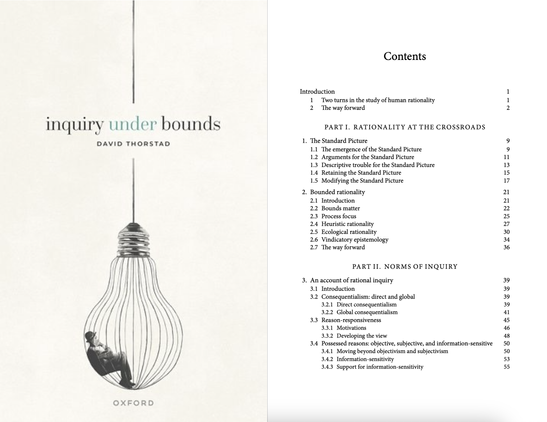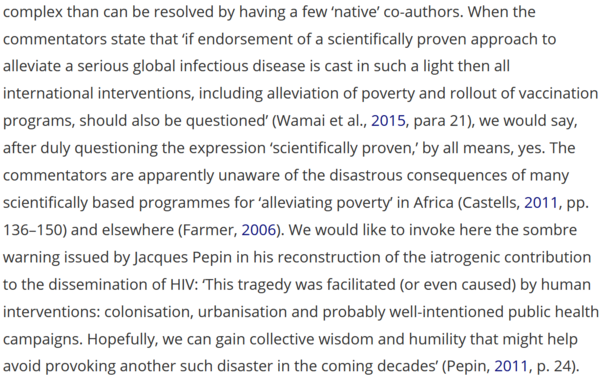#Positivism
—Suzanne Gieser, The Innermost Kernel: Depth Psychology and Quantum Physics. Wolfgang Pauli's Dialogue with C.G. Jung
#pauli #comte #positivism
A.N. Whitehead in "Nature and Life" on Positivism
The greatest revolutions in physics since the 17th century, occurred from 1900 to 1930, and this had a huge effect on philosophy. Some philosophers attempted to formulate a scientific metaphysics, whilst others turned against any attempts to incorporate the two...
#science #philosophy #physics #RudolfCarnap #moritzschlick #anwhitehead #einstein #augustcomte #kurtgodel #positivism #ViennaCircle #pragmatism #ordinarylanguagephilosophy #historyofphilosophy #metaphysics https://philosophyindefinitely.wordpress.com/2020/11/18/physics-positivism-and-early-wittgenstein/
They say to be positive while entering an exam, so I skipped "Islam Religion" part in YKS practice.
#positive #positivist #positivism #science #scientific #religion #religious #islam #islamic #yks #exam #prep #examprep #practice #test #practicetest #fun
Beim #digitalFightClub teilt @nele das, was die Internet toll macht. Das ist ein Gute-Laune-Vortrag am Freitag Abend! Super.
There was a development from 19th century into 20th century empiricism of the positivists movement with its insistence that all knowledge claims must meet the standards of empirical science, but a number of things led to the demise of logical positivism....
#language #linguistics #wittgenstein #jlaustin #Ayers #BertrandRussell #Searle #dialectic #knowledge #gilbertryle #positivism #philosophy #historyofphilosophy #fmdnetwork https://philosophyindefinitely.wordpress.com/2020/07/18/ordinary-language-philosophy/
#ColinMcGinn - Can #Metaphysics Discover #Surprises?
https://www.youtube.com/watch?v=lcIYa3wUrhQ
#Philosophy #Reality #Matter #Energy #Existence #Categories #Materialism #Abstraction #Platonism #Mathematics #Numbers #Space Time #SpaceTime #Mentality #PhilosophyOfScience #Science #Language #Causality #Contingency #Event #Events #Positivism #LogicalPositivism #Verification #Necessity #CloserToTruth #RobertKuhn
This week's second post introduces five characteristics of #boundedRationality and contrasts it with a received Standard Picture of #rationality.
"I suggest that we should sometimes blame the #theory." –David Thorstad, author Inquiry Under Bounds (#OUP 2024), an #openAccess book
#epistemology #cognitiveScience #decisionScience #history #economics #behavioralEconomics #psychology #HerbSimon #EdwardStein #science #philosophyOfScience #philosophy #pragmatism #positivism
It's come up a couple times now, so this addition will be about #positivism (scientific method).
The big problem with positivism is that, utterly without justification, it asserts a privilege to determine what ways of knowing and what methods of inquiry are “legitimate,” while preferring superficial quantitative data to rich narrative. In so doing it limits methodologies and evidence to those which affirm positivist values—hence positivism’s historical role in colonization (oh, you didn’t know about that?).
It seeks “objective” truth, which does not exist among mere mortals. All of our knowledge, one way or another, is somehow subjective. The better approach in inquiry is to acknowledge this subjectivity and to be introspective and critical in viewing evidence. In qualitative scholarly work, we include a statement of our background with respect to, and our perspective on, the issue at hand, so that readers can better judge for themselves how these might bias our subjective views.
Especially in the social sciences, naïve positivism relies heavily on statistical methods. True experiments in laboratory settings are meant to limit intervening variables that muddy linearly causal relationships, but our social world is all about those intervening variables and in General Systems Theory, we understand that linear causality is the exception, not the rule. Mutual causality predominates in both the natural and social worlds—but positivism assumes linear causation.
It’s not that I reject positivism. I am typing this and I earned my Ph.D. (in Human Science) writing papers on devices that positivists invented. It works. But it works in relatively constrained conditions. As an approach to inquiry, relying on it is like wearing blinders, which is probably not how you want to approach most inquiry. This shows up especially in the social sciences, where a utilitarian approach embracing statistical aggregates effectively excludes minorities (hence, for example, systemic racism)—do this with enough issues and those minorities can add up to a majority (there are some overlaps, but the Venn diagram is by no means a single simple circle).
When politicians rely on positivism (early anthropologists “studying” indigenous populations effectively enabled settler colonialism with positivism—their colonizing masters expected this), they may find that their imagined majorities are in fact minorities—hence the Democratic Party which has spent most of the last several decades embracing neoliberalism, an ideology masquerading as economics, a field which is only now slowly deprogramming itself from combined capitalist and positivist ideologies.
It’s not that you don’t use positivist methodology. It’s that you reject positivism’s inappropriate appropriation of the authority to reject other ways of inquiry and you sneer at its pretense to “objectivity.” It’s that you look around, critically, examining context (positivism calls this an “intervening variable” that should be “controlled” for), listening to what people say, looking for absences, examining how causal relationships (especially including authoritarian power relationships) work.
I think of positivist results as questions. And I have questions about the research itself, including: Why did this research produce this result? Are qualitative variables operationalized (substituted for with quantitative variables) appropriately? How constrained is the theoretical discussion—and why? What else might be going on? What do people say and, crucially, how do they know?
And, while I am highly educated, I absolutely do not claim objective knowledge. In casual communication, I often omit many of the qualifiers I would include in scholarly work because they can muddy the message or suggest more doubt than there is.
But if you embrace positivism’s arrogance, you’ll be blocked.
Another one.
-- Atheist Debunks Catholic Friar Fallacies --
(from TheSkepTick)
https://www.youtube.com/watch?v=3B-OoZrCZGQ
#naturalism #determinism #physicalism #positivism #freeWill #theism #God
-- Friar Is Bitter That People Have Critical Thinking Skills --
(from TMM)
https://www.youtube.com/watch?v=QAuLF6vXiCs
#naturalism #determinism #physicalism #positivism #freeWill #theism #God
#RobertLaughlin - Are #Life and #Mind Inevitable in the #Universe?
https://www.youtube.com/watch?v=zNwIwHCOo64
#Philosophy #PhilosophyOfScience #Science #PhilosophyOfCosmology #Cosmology #FineTuning #Multiverse #Religion #Hinduism #AnthropicPrinciple #Causation #Physics #Experiment #Positivism #CloserToTruth #RobertKuhn
Making the circumcision controversy controversial: Going meta and taking aim at the messenger(s): Reply to Wamai et al.,
de Camargo Jr et al., 2015, Global Public Health
"For those of us who study the use of rhetoric in science, their commentary offers a fascinating example of many of the well-documented observations made by authors working in Science and Technology Studies."
https://www.tandfonline.com/doi/full/10.1080/17441692.2014.989533
#Science #Colonization #Positivism #Epistemology #MetaScience
Back when I produced a whole series on Lev Shestov's book All Things Are Possible, I didn't get around to this video on his views on positivism and metaphysics. I shot it last week, and here it is!
https://youtu.be/ogTz0pxSIKg
#Video #Shestov #Positivism #Philosophy #Metaphysics
A thought about #doomerism vs #positivism...
In society's #collapse, billions of people will die, and billions of people will survive.
The only chance we have of minimizing the death and suffering is to convince people they're likely to be among the dead. People won't take the drastic measures that are needed unless they're scared for themselves or their loved ones.
Doomerism tries to convince people they're at risk. Positivism tells them not to worry.
Which is better harm reduction praxis?
This #FloridaMan problem is because the selected variable is too broad and catching #falsepositive. Or, in #legal terms, there are #gaps in the #law, ala #pigs and #positivism, https://media.law.wisc.edu/s/c_8/ftdxm/hartog-pigsandpositivism.pdf
The Catechism of Positive Religion
(1891) Comte, Auguste
Cambridge University Press
ISBN: 978-1-108-00087-1
#my_bibtex #history #positivism #religion #science #worship
"By the time it's named, it's already over."
Henderson's Law of Intellectual Fads
#postmodernism
#neoliberalism
#liberationtheology
#voluntarysimplicity
#secularhumanism
#dominiontheology
#behaviourism
#positivism
#revisionism
#malthusianism
#antidisestablishmentarianism (takes longer to write than it lasted)
#postfeminism
#deism
#existentialism
#nouvellecuisine
The Origins of Positivism
(2001) : Turner, Jonathan H.
isbn: 9780761958406
#social_theory #positivism #super_organic_bodies #herbert_spencer #sociology #organismic_analogy #auguste_comte #my_bibtex
Good evening, Mastadonies & Mastadonets. . I wish everyone a connected and memorable weekend. Remember to choose positivity, and being positive isn't fake: it's intelligent, an intelligent choice. I will most definitely practice what I preach.❤️#positivism #positivity

